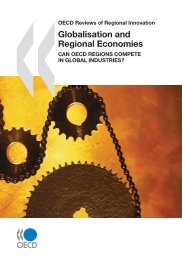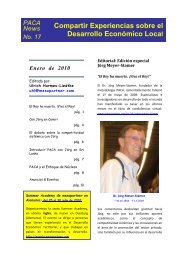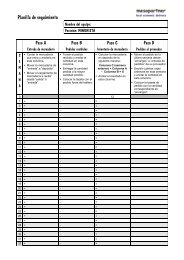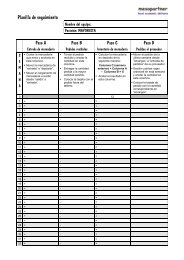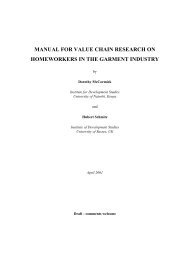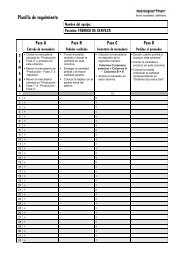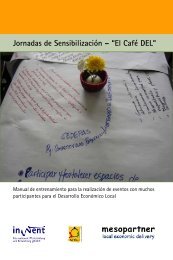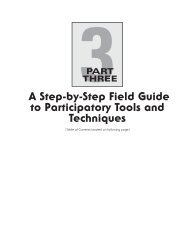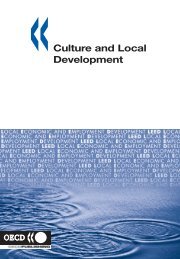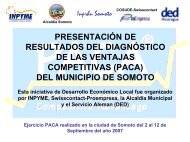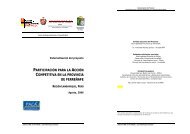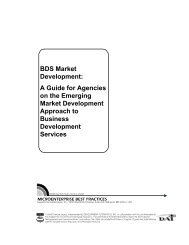R Chambers - Notes for participants in PRA-PLA course.pdf - PACA
R Chambers - Notes for participants in PRA-PLA course.pdf - PACA
R Chambers - Notes for participants in PRA-PLA course.pdf - PACA
Create successful ePaper yourself
Turn your PDF publications into a flip-book with our unique Google optimized e-Paper software.
3<br />
<strong>PLA</strong> stands <strong>for</strong> Participatory Learn<strong>in</strong>g and Action. As a term it is often used<br />
<strong>in</strong>terchangeably with <strong>PRA</strong>.<br />
Perhaps each of us should give our own answers to what <strong>PRA</strong> or <strong>PLA</strong> is or should be.<br />
"Use your own best judgement at all times" is one part of the core of what <strong>PRA</strong>/<strong>PLA</strong><br />
has become. It cont<strong>in</strong>ues to evolve and spread so fast that no def<strong>in</strong>ition can or should<br />
be f<strong>in</strong>al. An older description could be updated to read that it is:<br />
a grow<strong>in</strong>g family of approaches, methods, attitudes and behaviours to enable<br />
and empower people to share, analyse and enhance their knowledge of life and<br />
conditions, and to plan, act, monitor, evaluate and reflect". (Emphasis <strong>for</strong><br />
additions)<br />
Many make a dist<strong>in</strong>ction between RRA and <strong>PRA</strong>/<strong>PLA</strong>. For them, RRA is about<br />
f<strong>in</strong>d<strong>in</strong>g out. It is data collect<strong>in</strong>g, with the analysis done ma<strong>in</strong>ly by “us”. Good<br />
<strong>PRA</strong>/<strong>PLA</strong>, which evolved out of RRA, is <strong>in</strong> contrast empower<strong>in</strong>g, a process of<br />
appraisal, analysis and action by local people themselves. There are methods which<br />
are typically RRA methods (observation, semi-structured <strong>in</strong>terviews, transects etc)<br />
and others which are typically <strong>PRA</strong>/<strong>PLA</strong> methods (participatory mapp<strong>in</strong>g,<br />
diagramm<strong>in</strong>g, us<strong>in</strong>g the ground <strong>in</strong> various ways, mak<strong>in</strong>g comparisons etc, often <strong>in</strong><br />
small groups). <strong>PRA</strong>/<strong>PLA</strong> methods can be used <strong>in</strong> an RRA (data collect<strong>in</strong>g or<br />
extractive) mode (but see cautions below), and RRA methods can be used <strong>in</strong> a<br />
<strong>PRA</strong>/<strong>PLA</strong> (empower<strong>in</strong>g) mode.<br />
Labels are a problem but we seem to be stuck with them. For <strong>PRA</strong> "appraisal" is<br />
hopelessly <strong>in</strong>appropriate now. Good <strong>PRA</strong> is a process, not a one-off event. It<br />
<strong>in</strong>volves much more than just appraisal. The ma<strong>in</strong> publication RRA <strong>Notes</strong> (numbers<br />
1-21) (1988 onwards) was renamed <strong>PLA</strong> (Participatory Learn<strong>in</strong>g and Action) <strong>Notes</strong><br />
(numbers 22-49) and is now Participatory Learn<strong>in</strong>g and Action (number 50 - ) <strong>for</strong><br />
<strong>in</strong><strong>for</strong>mation and copies try www.earthpr<strong>in</strong>t.com or www.iied.org]. Participatory learn<strong>in</strong>g<br />
and action is what many practitioners of <strong>PRA</strong> believe <strong>in</strong> and are do<strong>in</strong>g, but <strong>PRA</strong> is<br />
still the label many use. In Pakistan <strong>PRA</strong> now stands <strong>for</strong> Participation-Reflection-<br />
Action. Garett Pratt’s (January 2001) Practitioners’ Critical Reflections on <strong>PRA</strong> and<br />
Participation <strong>in</strong> Nepal (IDS Work<strong>in</strong>g Paper 122, on the IDS website) ends with a<br />
practitioner’s suggestion “I believe that <strong>PRA</strong> gives a better mean<strong>in</strong>g when we say<br />
participatory reflection and action…That is really what we have to do”. At its core<br />
many now see critical self-awareness, personal behaviour and attitudes, particpatory<br />
relationships, and engagement with action.<br />
Some of the best facilitators and practitioners have moved beyond any limited sense<br />
of <strong>PRA</strong> to embrace methodological pluralism. They talk of and use “participatory<br />
methodologies”. There are many of these such as popular theatre, Reflect<br />
(Regenerated Freirian Literacy through Empower<strong>in</strong>g Community Techniques),<br />
Plann<strong>in</strong>g <strong>for</strong> Real, Stepp<strong>in</strong>g Stones, Appreciative Inquiry, Tra<strong>in</strong><strong>in</strong>g <strong>for</strong><br />
Trans<strong>for</strong>mation, and STAR. They can be comb<strong>in</strong>ed and are evolv<strong>in</strong>g <strong>in</strong> <strong>in</strong>numerable<br />
ways. Between them all there can be “shar<strong>in</strong>g without boundaries”.<br />
So good <strong>PRA</strong> is about empower<strong>in</strong>g. It is l<strong>in</strong>ked with dist<strong>in</strong>ctive behaviours, attitudes,<br />
approaches and relationships. "We" are not teachers or transferors of technology, but<br />
<strong>in</strong>stead convenors, catalysts, and facilitators. We have to unlearn, and put our



